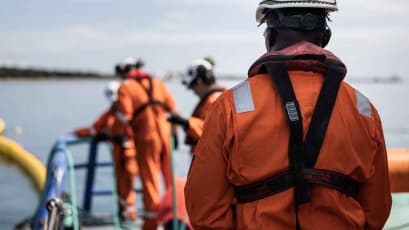understanding Oil Pollution Emergency Plans (OPEPs): purpose, types and what happens next
The oil spill preparedness planning process is a structured approach to developing a spill response capability. It allows an effective initial response to an oil spill, in addition to sustaining an ongoing response proportionate to the risk.
For oil and gas related operations within the UK Continental Shelf (UKCS) whereby an offshore installation presents a risk of oil pollution, an approved Oil Pollution Emergency Plan (OPEP) must be prepared, submitted for approval and implemented in accordance with the OPRC Regulations[1] and in compliance with the Guidance Notes for preparing OPEPs[2].
Why do I need an OPEP?
An OPEP is the output of the oil spill preparedness planning process, establishing a robust tiered preparedness and response framework. Previous experience demonstrates that by having a well-developed, approved, implemented, and exercised OPEP, there is the possibility to reduce the potential impact of an oil spill incident on people, the environment, assets, and business reputation. This includes having suitably trained personnel, an adequate response capability, well executed and exercised scenario planning, and relevant oil spill preparedness plans in place.

What type of OPEP do I need?
There are several approaches a company can adopt when preparing an Oil Pollution Emergency Plan (OPEP). Below are the various types of OPEPs that can be developed based on operational needs.
| Type of OPEP | Description | Response Arrangements Covered |
|---|---|---|
| Onshore OPEP | Includes Tier 2 and 3 response arrangements and specific operational information to support an onshore response team. It can be supplemented by a Production Installation/Field OPEP or a Temporary Operations OPEP (TOOPEP). | Tier 2 & 3 |
| Production Installation/Field OPEP (Offshore OPEP) | Details Tier 1 response arrangements for production installations or fields, including operational information to aid offshore response teams. | Tier 1 |
| Consolidated OPEP | Combines the Onshore and Production Installation/Field OPEP requirements into one comprehensive document covering all response levels. | Tier 1, 2 & 3 |
| Temporary Operations OPEP (TOOPEP) | Addresses Tier 1 response arrangements for temporary offshore operations, such as drilling or intervention activities, and aligns with Onshore OPEP requirements. | Tier 1 |
| Consolidated TOOPEP | Integrates Onshore OPEP and TOOPEP requirements into a single document, covering all response levels for temporary operations. | Tier 1, 2 & 3 |
| Communication and Interface Plan (CIP) | Links multiple OPEPs for specific operational activities and provides additional relevant information to ensure effective coordination. | Varies (links multiple OPEPs) |
| Pipeline OPEP | Developed for standalone pipeline operations not covered under other OPEPs, including all relevant response arrangements specific to the pipeline. | Tier 1, 2 & 3 |
What will be in my OPEP?
The relevant OPEP should be developed in accordance with the Guidance Notes for preparing OPEPs[1], and should include oil spill modelling that meets the modelling requirements[3]. The OPEP should also be produced to adhere to the International Good Practice Guidelines of the International Maritime Organization (IMO) and IPIECA. The OPEP should be written to interface with existing company emergency framework and any other relevant OPEPs.
The OPEP should be developed considering the company’s organisational response structure, oil spill risk profile, Tier 1, 2 and 3 response arrangements, and the overall response techniques available to the company. The OPEP should include certain key elements, such as:
- Response checklists and guidance for management / response personnel
- Organisational response structure
- Oil spill response techniques
- Tier 1, 2 and 3 response arrangements and capability
- Interfacing arrangements and requirements
- Operational overview
- Well and hydrocarbon data
- Oil spill modelling
- Environmental and socioeconomic sensitivities
- Primacy arrangements
I've got my OPEP - What now?
OPEP approval
The OPEP is required to be submitted to the Offshore Petroleum Regulator for Environment and Decommissioning (OPRED)[5] for review. The Guidance Notes for preparing OPEPs[1] clearly outlines the regulatory review period for each different type of OPEP.
OPRED will identify any additional (potential) consultees and contact them for comment. Following the regulatory review, any clarifications, or Non-Approval Issues (NAIs) will be sent to the company to undertake any necessary amendments prior to final approval by OPRED. You should be supported the company who procedured your OPEP throughout the regulatory approval process.
OPEP familiarisation
Once the OPEP has undergone a rigorous review process and has been approved by OPRED, then an exercise centred around the OPEP can be conducted[6]. This forms a crucial part of the training platform and ensures that the newly developed OPEP is introduced and made familiar to the relevant personnel who will be using it.
Review and update
Consultants are available to conduct reviews and updates to new or existing OPEPs. A specialist review may be required to assess that the OPEP still fully complies with the Guidance Notes for preparing OPEPs[1], is operationally up to date and that a sufficient response capability is still in place.
All variations to an existing OPEP are required to be submitted to OPRED for review. All live and relevant OPEPs must undergo a full review within five years of the date upon which the OPEP was first approved and a minimum of every five years thereafter.

References
[1] Merchant Shipping (Oil Pollution Preparedness, Response Co-operation Convention) Regulations 1998
[3] As defined within Appendix B – Modelling Guidance within the BEIS Guidance Notes for preparing OPEPs
[4] Specifically, Section A.3: OPEP Content Requirements and A.4: OPEP Assessment Templates within the BEIS Guidance Notes for preparing OPEPs
[5] The Department for Business, Energy and Industrial Strategy (BEIS), through its Offshore Petroleum Regulator for Environment and Decommissioning (OPRED) is responsible for administering environmental regulations covering offshore petroleum operations, including oil and gas exploration and production and gas unloading and storage, and for offshore CO2 storage operations within the UKCS.
[6] As defined within Appendix C – Training and Exercises within the BEIS Guidance Notes for preparing OPEPs




